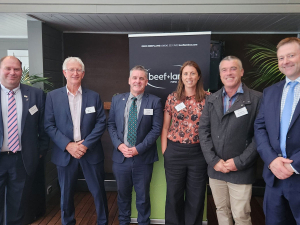Come and chat to the DairyNZ team
DairyNZ's team is looking forward to catching up with Southland and Otago dairy farmers at the Southern Field Days in Waimumu near Gore next month.
 The primary sector has laid out the five key issues they want acted on during the first 100 days of the new Government.
The primary sector has laid out the five key issues they want acted on during the first 100 days of the new Government.
While the new Coalition Government hopes to make fast progress in its first 100 days on key commitments made during the election campaign, farmers are hoping that ministers are clear about the primary sector’s priorities.
Leaders of Federated Farmers, Beef + Lamb NZ and DairyNZ have agreed their five key advocacy priorities over the next three months. These five priorities are all included in the coalition agreements agreed by National, ACT and NZ First.
Priority 1 is the repeal and replace the National Policy Statement for Freshwater Management (NPS-FM). This policy statement is a direction from David Parker to Regional Councils to set rules on farmers to meet new national bottom lines for freshwater and give effect to ‘Te Mana O Te Wai’.
Feds president Wayne Langford says a recent report has shown the new standards are unachievable even in areas of native forest or National Park.
“Plans developed so far need to implement draconian rules to come anywhere near the new standards. For example, Northland has released a draft plan that places restrictions on farming on land over 25 degrees – around 40% of the agricultural land in Northland.”
Priority 2 is establishing the Rural Regulation Review Panel.
“We want to see this up and running and working on cutting red tape and regulatory blocks for irrigation, water storage, managed aquifer recharge, flood protection and simply the day-to-day running of our farms,” notes Langford.
Priority 3 is to start the review of the unscientific methane targets. These are the targets that don’t recognise methane as a short-lived gas and, if achieved, could require a 20% reduction in sheep and beef production.
Priority 4 is to cease implementation of Significant Natural Areas, and Priority 5 is to repeal the last Government’s two resource management acts and start work on replacement legislation. A new RMA will take time to develop so it is important work starts on this right away, says Langford.
He says they are meeting regularly to discuss strategy and priorities to avoid duplication of effort and present a united front to decision makers.
“The new Government has made a range of very useful commitments. We aim to hold them to their agenda and keep them in touch with our united views on key issues,” he says.
Norwood has announced the opening of a new Tasman dealership at Richmond near Nelson next month.
Buying or building a rural or semi-rural property? Make sure you know where the wastewater goes, says Environment Canterbury.
With collars on more than seven million cows worldwide, Nedap says its standalone launch into New Zealand represents world-leading, reliable and proven smart technology solutions for dairy farmers.
The Meat Industry Association (MIA) is once again looking for game-changing ideas for New Zealand's red meat processing and exporting sector.
Environment Southland is inviting feedback on two bylaws that play a critical role in safeguarding the region's waterways and ensuring the safety of the local community.
While the North Island is inundated with rain, Southland is facing receding water levels as warm weather and lack of rainfall continues.

OPINION: Meanwhile, red blooded Northland politician Matua Shane Jones has provided one of the most telling quotes of the year…
OPINION: This old mutt has been around for a few years now and it seems these ‘once in 100-year’ weather…